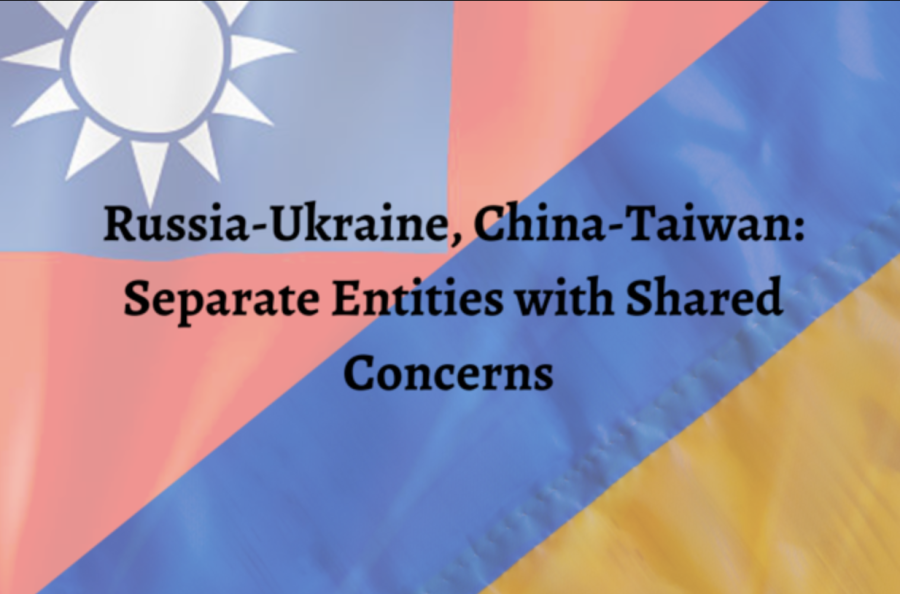Russia-Ukraine, China-Taiwan: Separate Entities with Shared Concerns
Since Russia’s invasion of Ukraine on Feb. 24, questions concerning China’s potential invasion of Taiwan have been brought up by domestic and international media. Despite both countries being constantly threatened with a potential invasion, Taiwan’s situation largely differs from that of Ukraine’s.
History
Russia and Ukraine relations trace back to 1783, when Ukraine was annexed by Imperial Russia. Throughout the 19th century, Russia strengthened control over the region by attempting to assimilate Ukrainians into Russian culture. However, with growing independence sentiment, in 1917, the Ukrainian Central Rada (council) issued the “Universal of Ukrainian People,” declaring Ukraine’s autonomy.
Fast forward to the 20th century. Ukraine is now industrialized and still independent. In 2004, a surge in political protests known as the Orange Revolution pervaded Ukraine. Protestors claimed that the presidential election of Viktor Yanukovych, who was supported by Russian President Vladimir Putin, was a fraud, hence escalating tensions between the two countries.
As for Taiwan, in 1895, Japan won the First Sino-Japanese War, and the Qing government had to cede Taiwan to Japan after ruling Taiwan for centuries. After World War II, Japan surrendered, and China began ruling Taiwan again. In the next few years, a civil war broke out in China, where then-leader Chiang Kai-shek’s troops were beaten back by Mao Zedong’s Communist armies. With Chiang Kai-shek, the Kuomintang (KMT) fled to Taiwan.
Since the 1980s, China and Taiwan have operated under a “one country, two systems” formula. The system was established in Hong Kong as well, where in the past years, protesters have demonstrated against China’s increasing influence. Taiwan watches this closely.
Taiwan’s domestic politics largely construct public opinion regarding the “One China” policy, which refers to the recognition of Taiwan as a part of China. The Democratic Progressive Party (DPP) steers towards relative independence, while the KMT party gravitates toward relatively peaceful relations with China.
International Recognition
Ukraine has been recognized as an independent nation since the fall of the Soviet Union in 1991, where it officially gained independence. Since then, the country has taken part in the United Nations (UN), the World Health Organization (WHO) and other intergovernmental organizations globally.
Taiwan, on the other hand, is not recognized as a nation by most countries in the world, with only 15 countries officially recognizing Taiwan as an independent country. Despite the recent efforts by the DPP in creating unofficial alliances with countries like the US, Japan, Lithuania and more, Taiwan is barred from entering various intergovernmental organizations, such as the UN and WHO.
Trade relations
Taiwan’s international trade is largely dependent on the U.S.-China trade war, forcing Taiwan to diversify its trade policy, shifting away from reliance on China. In Sept. 2016, President Tsai Ing-wen created the New Southbound Policy, allowing Taiwan’s exports and investments to Southeast Asia to rise significantly. Taiwan’s tumultuous relations with China, followed by the U.S.-China trade war, make its strategic industries central to its economic development.
The semiconductor industry has allowed Taiwan to strengthen its ties to the U.S. through outbound investment, with Taiwanese foundries accounting for 63% of the global market. With its globally widespread semiconductor industry, Taiwan’s shift from heavy reliance on the Chinese market shows its growing economic independence and diplomatic detachment (or expansion).
Unlike Taiwan, natural resources and the defense industry have been central to Ukraine’s economy. China has demonstrated its economic interest in Ukraine’s barley and iron ore supplies, replacing Russia as Ukraine’s largest trading partner by 2019. Ukraine’s arms supply is also central to Chinese economic interest; its arms supply is second to Russia.
U.S. Strategic Ambiguity
The U.S.’s diplomatic stance on Taiwan is essentially based on its ties to China. Although the U.S. has declared “strategic ambiguity” with regard to Taiwan’s independence, the U.S. claims that they will be militarily involved if China attacks. In the case of Ukraine, the U.S. has decided to not intervene militarily. This may prompt Taiwan to reconsider and strengthen its self-reliance.
Geography
As the second largest European nation, Ukraine borders Russia on its east and through its southern region, Crimea, which has been annexed by Russia since 2014. Since Crimea was annexed by Russia eight years ago, the Russians have the ability to enter Ukraine by land through two directions, one from the east and one from the south (Crimea). Russia controls most of the Black Sea as well, without any interference from international navies, allowing it to gain access to most of Ukraine’s trade economy in the Black Sea. By cutting off one of Ukraine’s biggest economical ventures, Russia can devastate the Ukrainian economy and weaken the country, allowing an invasion to take place.
Furthermore, as Ukraine was part of Russia until the fall of the Soviet Union in 1991, Russia has familiarized itself in understanding the geographic situation in Ukraine, allowing Russia to utilize its knowledge of the terrain to create well constructed and strategic plans to invade the country.
Meanwhile, Taiwan stands alone as an island, separated from China through the Taiwan Strait. Since Taiwan does not border China, a particularly strong naval power from China would be necessary for China to cross the Taiwan Strait and to the island. Despite having the most warships in the world, many of China’s warships are of smaller classes and therefore not commonly used in major combat operations. Not only would China need to invest in building and preparing a powerful and durable navy, it would also need to face the US Navy’s Seventh Fleet, which is stationed in the Taiwan Strait. Crossing the Taiwan Strait and invading Taiwan would cause China to interfere with the US Navy, which would escalate to a greater conflict.
With rising conversation and hysteria among the Taiwanese people on a potential invasion from China, Russia’s attack on Ukraine hits closer to home. As tensions in the Taiwan Strait continue to rise, it is no surprise that Taiwan’s self-awareness prompts it to draw parallels with Ukraine. However, as Taiwan closely watches the situation in Ukraine unfold, international support has proven to emerge as a central factor in supporting Taiwan’s fate.

Amber is the co-editor-in-chief of The Blue & Gold. She has lived in Taiwan her entire life and has been at TAS since first grade. When she is not...


![A myriad of impressive trophies and awards. [ANNABELLE HSU/THE BLUE & GOLD]](https://blueandgoldonline.org/wp-content/uploads/2025/09/Awards2-600x256.jpeg)
![Students' calendars say goodbye to exam week. [ANNABELLE HSU/THE BLUE & GOLD]](https://blueandgoldonline.org/wp-content/uploads/2025/09/Exam-week-600x370.jpg)
![A collection of college flags. [PHOTO COURTESY OF AMBER HU ('27)]](https://blueandgoldonline.org/wp-content/uploads/2025/05/IMG_5029-600x289.jpeg)

![An SAT word cloud. [PHOTO COURTESY OF WORDCLOUDS]](https://blueandgoldonline.org/wp-content/uploads/2025/05/SAT-600x600.jpeg)